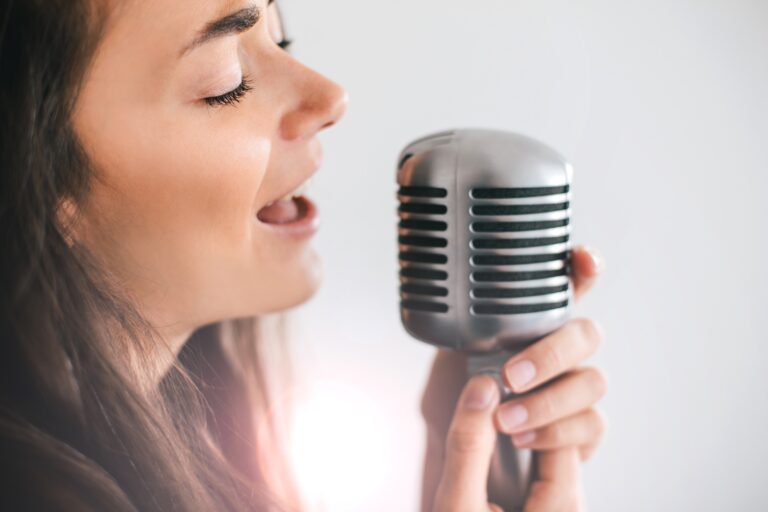Vocal health and lifestyle That Affect Your Singing Voice
Your voice isn’t just a gift—it’s a delicate instrument, shaped by your Vocal health and lifestyle, habits, and daily choices. While warmups and vocal exercises are crucial, your diet and lifestyle have a massive impact on how your voice performs.
If you’re a singer or public speaker, ignoring this aspect can lead to strain, fatigue, or long-term vocal issues. In this blog, we’ll explore what to eat, drink, and avoid, along with lifestyle habits that can either protect or damage your singing voice.
1. Foods That Help Your Voice

Eating the right foods can hydrate, soothe, and strengthen your vocal cords.
✅ Top Vocal-Friendly Foods:
- Steamed veggies – Light, hydrating, and easy to digest
- Fruits high in water (melon, apples, grapes) – Hydrate and cleanse
- Whole grains – Provide steady energy for long sessions
- Leafy greens – Full of antioxidants that reduce inflammation
- Ginger & turmeric – Natural anti-inflammatories
- Warm oatmeal – Soothes throat without mucus production
These foods keep the body balanced, which in turn supports consistent, powerful singing.
2. Foods to Avoid Before Singing

Some foods may not harm your body, but they can negatively affect vocal performance.
❌ Avoid These Before Singing:
- Dairy products – Cause mucus buildup and throat coating
- Caffeine – Dehydrates the vocal folds
- Fried or spicy foods – Trigger acid reflux and throat irritation
- Chocolate – Can thicken mucus and dry the throat
- Processed sugar – Inflammation and throat dryness
- Ice-cold beverages – Can tighten vocal muscles temporarily
Pro tip: If you need coffee, balance it with extra water.
3. Best Drinks for Vocalists
What you drink is as important as what you eat—especially before or during practice.
🥤 Recommended:
- Room-temperature water – The best vocal lubricant
- Warm herbal teas (chamomile, ginger) – Soothing
- Honey & lemon in warm water – A classic for clarity
- Coconut water – Natural electrolytes for hydration
- Soda or carbonated drinks – Cause burping or gas
- Cold water – Tightens vocal folds
- Alcohol – Dehydrates and numbs the throat
4. Lifestyle Habits That Affect Your Singing Voice

Your daily habits directly influence your vocal health—positively or negatively.
💡 Healthy Vocal Habits:
- Consistent sleep (7–8 hours): Essential for vocal recovery
- Hydration throughout the day: Not just before singing
- Regular vocal warm-ups and cool-downs
- Breathing exercises to improve control
- Moderate exercise to build stamina and core strength
⚠️ Habits to Avoid:
- Yelling, whispering, or talking loudly for long periods
- Smoking or exposure to smoke – Dries and damages vocal folds
- Overuse of the voice without rest
- Sleeping late or irregularly – Fatigues the voice
- Poor posture – Affects breath and resonance
5. Managing Stress and Its Vocal Impact
Stress causes tension in the throat, shallow breathing, and even vocal fatigue. Learning how to manage it is critical for voice care.
🧘♀️ Try This:
- Breathwork or pranayama to center the breath
- Mindful meditation to reduce mental tension
- Gentle neck and shoulder stretches to release physical tightness
- Journaling or affirmations to build confidence
A relaxed mind helps create a resonant, free-flowing voice.
6. What to Eat Before a Performance or Practice

Timing and food choices matter. Here’s what to aim for before singing.
🍽️ 1–2 Hours Before Singing:
- Small, balanced meal (e.g., rice, veggies, lean protein)
- Herbal tea or room-temp water
🍌 30 Minutes Before Singing:
- Light snacks like bananas, warm soup, or an apple
- Avoid anything sticky, dry, or dairy-based
7. Long-Term Vocal Health: Building a Singer’s Routine
Great vocalists don’t just sing—they live in a way that supports singing.
📆 Daily Vocal Routine (Sample):
- Morning: Hydration + 5-minute humming
- Midday: Balanced lunch, no dairy
- Evening: Vocal practice + cool-down
- Night: Herbal tea, neck stretches, 7–8 hours of sleep
It’s not just what you do on stage—but what you do every day—that protects your voice.
8. About The Mystic Keys – We Help You Sing Smarter

At The Mystic Keys, we understand that singing is both an art and a science. That’s why our one-on-one online vocal classes focus on total vocal health—including breathing, vocal techniques, lifestyle, and mental preparation.
🎤 Learn:
- How to sing safely and powerfully
- Breath control, posture, and range expansion
- What to eat and avoid as a vocalist
- Performance coaching and confidence building
Taught by certified Grade 8 and Trinity teachers, our classes include personalized notes, session recordings, and custom vocal plans. Whether you’re a beginner or preparing for a professional performance—we’ve got your voice covered.
🌐 Learn more at: The Mystic Keys
Conclusion: Your Voice Reflects Your Choices
The food you eat, the water you drink, the sleep you get, and the habits you build all play a vital role in your vocal longevity and performance.
With mindful diet and lifestyle choices, you can keep your voice strong, flexible, and full of life—every time you sing.
Sing smart. Sing healthy. Sing beautifully.
Explore Western Vocals Lessons Online designed to help you improve your musical timing with techniques like metronome practice, tapping, and rhythm drills for better accuracy.
For more information and exciting resources about learning music, visit our website at The Mystic Keys. For more music content and exciting offers follow us on
Facebook, Instagram, YouTube, LinkedIn, Twitter, Pinterest, Reddit, Threads,
and Quora.
Related Blogs
Playing a musical instrument is a deeply rewarding pursuit, blending artistry, skill, and discipline into a lifelong journey. Whether you’re just starting out or have years of experience, there’s always room for growth.
Choosing the right instrument is one of the most exciting steps in a beginner’s musical journey. Whether you’re a parent enrolling your child, a teenager chasing a passion, or an adult reigniting an old dream, the first instrument you choose plays a big role in your learning experience.
When starting your musical journey, choosing the right instruments best for beginners is crucial to ensuring an enjoyable and rewarding learning experience. Selecting an instrument that suits your personal preferences, physical abilities, and musical goals can significantly impact how motivated you stay and how quickly you progress.








